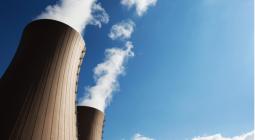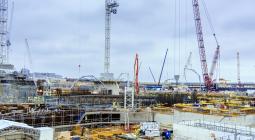EDF takes €12.9bn hit after Hinkley Point C delays and cost overruns
French energy firm swung to profit in 2023 despite impairment charge on struggling nuclear project in UK
The owner of the Hinkley Point C power plant has taken a near €13bn hit after delays and cost overruns to the vast nuclear project, which have triggered international political tensions.
France’s EDF Energy said it had taken a €12.9bn (£11bn) impairment charge on the project, weeks after it blamed inflation, Covid and Brexit for a four-year delay and extra £2.3bn bill for the Somerset plant.
The company said last month the project was now expected to be completed by 2031 and cost up to £35bn. When inflation is factored in, this figure could reach £46bn. It was originally expected to be complete by 2017, and cost £18bn.
EDF said on Friday: “The cost of civil engineering and the longer duration of the electromechanical phase (and its impact on other work) are the two main reasons for this cost revision.”
Despite the Hinkley hit, EDF said it had bounced back to a group profit of €10bn, after record losses in 2022 caused by outages due to maintenance at its reactors across France. It is carrying net debts of €54bn.
The cost overruns at Hinkley have caused tensions between Britain and the French government, the owner of EDF after last year’s full nationalisation of the company.
EDF, which owns 68% of Hinkley, is solely on the hook for cost overruns at Hinkley after its Chinese partner, which owns the remaining 32%, stopped funding.
China’s CGN stopped backing overruns at Hinkley after it was removed from the plant’s sister project, Sizewell C in Suffolk, over security fears.
The French finance minister, Bruno Le Maire, said this week it would be “fair” for Britain to share the burden of the extra costs.
French officials have been lobbying the UK to provide state guarantees on loans related to the Hinkley project, the FT reported. However, the UK government has so far stood firm, insisting that EDF shoulders the cost of the project.
The impairment at Hinkley marks the culmination of tensions seeded a decade ago when all six trade union representatives on the board of EDF voted against building the power station at Hinkley, and its then finance chief, Thomas Piquemal, resigned over the cost risk.
While UK bill payers are insulated from the cost overruns at Hinkley, they will be exposed to equivalent risks at Sizewell, which has a different funding model. The UK government and EDF are co-investors in the project, and are on the hunt for other international backers.
EDF said it had almost completed a process to repair 16 reactors with corrosion problems, and 46 reactors were online at the end of January, bolstering its electricity generation. It also increased its output of wind, solar and hydroelectric power.
Luc Rémont, the chair and chief executive of EDF, said: “2023 marks the return of the company’s operational performance at a better level, after a year of industrial difficulties and exceptional regulation unfavourable effects in 2022. With these good results, EDF has met its financial targets and reduced its financial debt.”
Cover photo: One of two nuclear reactors being built at Hinkley Point C nuclear power station, near Bridgwater in south-west England. Photograph: Daniel Leal/AFP/Getty Images





